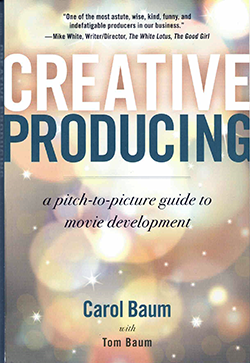Creative Producing: A Pitch-to-Picture Guide to Movie Development by Carol Baum with Tom Baum; New York: Allworth Press © 2023; ISBN 9781-621-538370; 205 pages including appendices; $19.99.

 SAN DIEGO – Author Carol Baum worked her way up through the movie industry, serving as a studio executive and later as an independent creative producer. In her latter role, she finds scripts that she thinks are worthy of becoming movies, assembles a creative team including a writer, director, and, if possible, a well-known actor then goes about selling the project to a studio or to a private financier.
SAN DIEGO – Author Carol Baum worked her way up through the movie industry, serving as a studio executive and later as an independent creative producer. In her latter role, she finds scripts that she thinks are worthy of becoming movies, assembles a creative team including a writer, director, and, if possible, a well-known actor then goes about selling the project to a studio or to a private financier.
It’s a career in which she has to deal with many personalities, some of them with egos more fragile than others, but it is a job that, when everything clicks, can result in memorable movie-making. This book is part memoir, part advice, and is a good introduction for film students and serious fans of cinema. As Baum teaches a course in creative producing at the University of Southern California, the volume can also serve as a working textbook.
Spicing up the “how to” book are her occasionally gossipy recollections of working with some well-known actors, directors, and writers, emphasizing some pitfalls to avoid for prospective producers. Generally, her advice would please the late Dale Carnegie: Be honest and respectful of others wherever they may be on the Hollywood food chain. Yesterday’s assistant may be tomorrow’s decision maker. Don’t take rejection, even other people’s rudeness, personally; such behavior is likely a reflection of their insecurities rather than an indication of anything you might have done wrong. If a script you’ve pitched is rejected, don’t throw it away, put it in a trunk. It may come back into fashion. Keep records of everyone you have talked to on a project; send out follow-up letters; be persistent; keep making contacts in the industry. When agreements are made, get them in writing. She didn’t quote Samuel Goldwyn, but it’s clear she agrees with his observation that “an oral contract isn’t worth the paper it is written on.”
Baum described herself as having grown up a Jewish girl in New Jersey and confides that sometimes shared experiences from childhood can be the basis of friendships with others in the Hollywood realm. She had an early affinity for watching movies, confiding that the movie theatre was her synagogue. Among her credits as an executive producer and a producer, I spotted one movie that was Jewish themed: A Stranger Among Us about an undercover detective who poses as a Chasid to solve a crime. A comedy, I.Q., was about Albert Einstein being a matchmaker at Princeton University. Her filmography, compiled between 1984 and 2023, indicates a wide range of genres: Buffy the Vampire Slayer; Father of the Bride; $5 a Day; Boychoir, and three Christmas movies for the Hallmark channel.
Among her early jobs was serving as an executive at Sandollar Productions under Dolly Parton, who commented on the back cover of Baum’s book that she “is one of the most decent, capable, and talented people I’ve ever worked with.” This rings true as you read this worthwhile book, on which her screenwriter husband, Tom Baum, collaborated.
*
Donald H. Harrison is editor emeritus of San Diego Jewish World. He may be contacted via donald.harrison@sdjewishworld.com